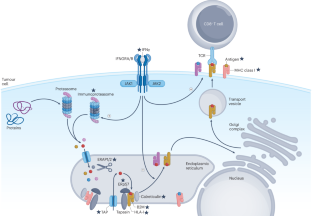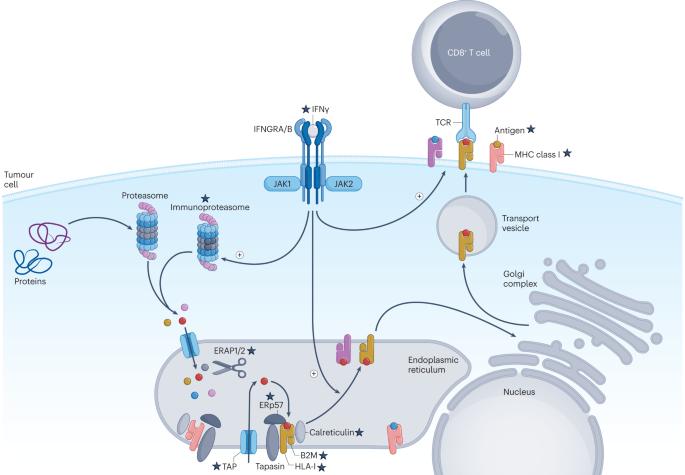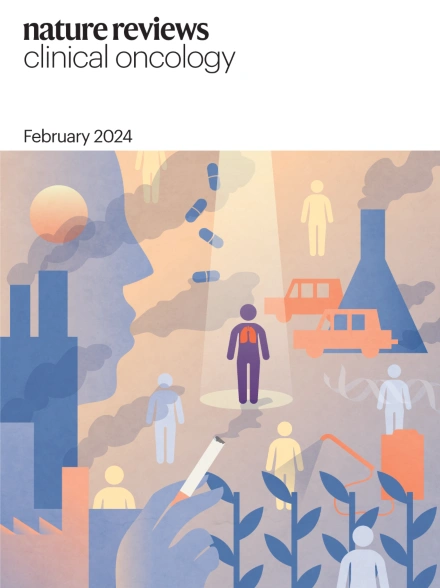Antigen presentation in cancer — mechanisms and clinical implications for immunotherapy
IF 82.2
1区 医学
Q1 ONCOLOGY
引用次数: 4
Abstract
Over the past decade, the emergence of effective immunotherapies has revolutionized the clinical management of many types of cancers. However, long-term durable tumour control is only achieved in a fraction of patients who receive these therapies. Understanding the mechanisms underlying clinical response and resistance to treatment is therefore essential to expanding the level of clinical benefit obtained from immunotherapies. In this Review, we describe the molecular mechanisms of antigen processing and presentation in tumours and their clinical consequences. We examine how various aspects of the antigen-presentation machinery (APM) shape tumour immunity. In particular, we discuss genomic variants in HLA alleles and other APM components, highlighting their influence on the immunopeptidomes of both malignant cells and immune cells. Understanding the APM, how it is regulated and how it changes in tumour cells is crucial for determining which patients will respond to immunotherapy and why some patients develop resistance. We focus on recently discovered molecular and genomic alterations that drive the clinical outcomes of patients receiving immune-checkpoint inhibitors. An improved understanding of how these variables mediate tumour–immune interactions is expected to guide the more precise administration of immunotherapies and reveal potentially promising directions for the development of new immunotherapeutic approaches. Immune-checkpoint inhibitors (ICIs) and other immunotherapies have revolutionized the treatment of patients with cancer. Nonetheless, most patients do not derive durable benefit, indicating a need for biomarkers to guide treatment selection. In this Review, the authors describe the role of antigen presentation in response to ICIs and other immunotherapies, with a focus on the role of molecular and/or genomic alterations affecting antigen presentation.


癌症中的抗原呈递-免疫疗法的机制和临床意义。
在过去的十年里,有效免疫疗法的出现彻底改变了许多类型癌症的临床管理。然而,长期持久的肿瘤控制只能在接受这些治疗的一小部分患者中实现。因此,了解临床反应和治疗耐药性的潜在机制对于扩大免疫疗法的临床益处水平至关重要。在这篇综述中,我们描述了肿瘤中抗原处理和呈递的分子机制及其临床后果。我们研究了抗原呈递机制(APM)的各个方面如何塑造肿瘤免疫。特别是,我们讨论了HLA等位基因和其他APM成分的基因组变异,强调了它们对恶性细胞和免疫细胞免疫肽的影响。了解APM,它是如何被调节的,以及它在肿瘤细胞中是如何变化的,对于确定哪些患者会对免疫疗法产生反应以及为什么一些患者会产生耐药性至关重要。我们关注最近发现的分子和基因组改变,这些改变驱动接受免疫检查点抑制剂的患者的临床结果。对这些变量如何介导肿瘤免疫相互作用的更好理解有望指导更精确的免疫疗法给药,并为开发新的免疫治疗方法揭示潜在的有希望的方向。
本文章由计算机程序翻译,如有差异,请以英文原文为准。
求助全文
约1分钟内获得全文
求助全文
来源期刊
CiteScore
99.40
自引率
0.40%
发文量
114
审稿时长
6-12 weeks
期刊介绍:
Nature Reviews publishes clinical content authored by internationally renowned clinical academics and researchers, catering to readers in the medical sciences at postgraduate levels and beyond. Although targeted at practicing doctors, researchers, and academics within specific specialties, the aim is to ensure accessibility for readers across various medical disciplines. The journal features in-depth Reviews offering authoritative and current information, contextualizing topics within the history and development of a field. Perspectives, News & Views articles, and the Research Highlights section provide topical discussions, opinions, and filtered primary research from diverse medical journals.

 求助内容:
求助内容: 应助结果提醒方式:
应助结果提醒方式:


